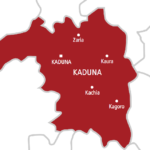The 2023 presidential election has come and gone, and preparations are in earnest for the governorship elections. To what extent will the outcome of the just concluded presidential election impact the forthcoming gubernatorial election in Kaduna State? This is the big question now.
The result of the presidential election in the state is revealing, especially for the ruling APC. Out of the total registered voters of 4,341,946, only 1,341,946 cast their votes. This is lower than the voter turnout in 2019 (1,709,005) and 2015 (1,617,482).
In terms of numbers, Kaduna Central Senatorial District had the highest valid votes cast of 520,264, followed by Kaduna North with 497,422 and Kaduna South 323,495.
This shows a declining trend in the political capital of the APC in the state. Winning only two LGAs and losing with a margin of 155,050 votes to its perennial rival, the PDP, in 2023 should be giving the party sleepless nights. It is a significant fall from the 2019 result, where the party won in 14 LGAs with a huge margin of 343,833 votes. Similarly, in 2015 the party won in 15 LGAs with a wide margin of 655,897.
The APC performed poorly in its strongholds in terms of highest contributors of votes to the party in the past elections.
Some factors need to be highlighted. In 2019 and 2015, the APC in the state got more votes in the gubernatorial elections than the presidential. In 2019, it got 1,035,427; while in 2015 it had 1,117,635 votes. This is more than the 993,445 and 1,099,093 votes obtained by its presidential candidate in 2019 and 2015.
The opposition parties in the state, aside stirring up sentiments against actions and inactions of the incumbent administration, have been near- absent over the past eight years in providing viable policy alternatives.
Nonetheless, what will influence the voting pattern in the gubernatorial election will be religion (Muslim-Muslim, Muslim-Christian and Christian-Muslim tickets), ethnic and regional suspicion, availability of money to buy institutions and votes – made up largely of undecided/swing votes.
Others include voter apathy in some sections of the state due to the outcome of the presidential election, ability to forge strategic alliances, deployment of data science in strategy execution and perception of the performance of the incumbent party.
It is pertinent to say that whatever the influence in the voting pattern, the consequences, good or bad, will be blind to our religions, ethnicity, regions or political parties.
We should be aware that our vote will determine our security and welfare over the next four to eight years.
Yusuf Ishaku Goje can be reached vide [email protected]
 Join Daily Trust WhatsApp Community For Quick Access To News and Happenings Around You.
Join Daily Trust WhatsApp Community For Quick Access To News and Happenings Around You.

